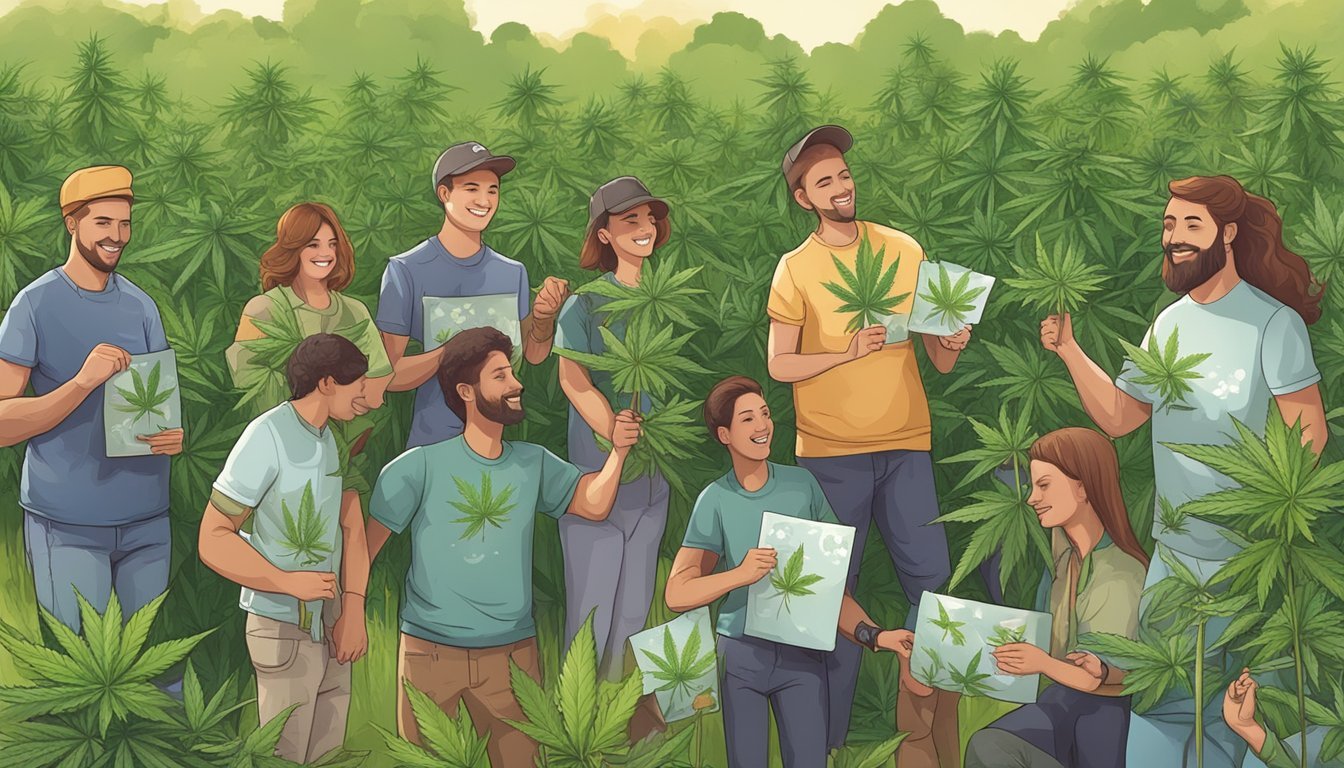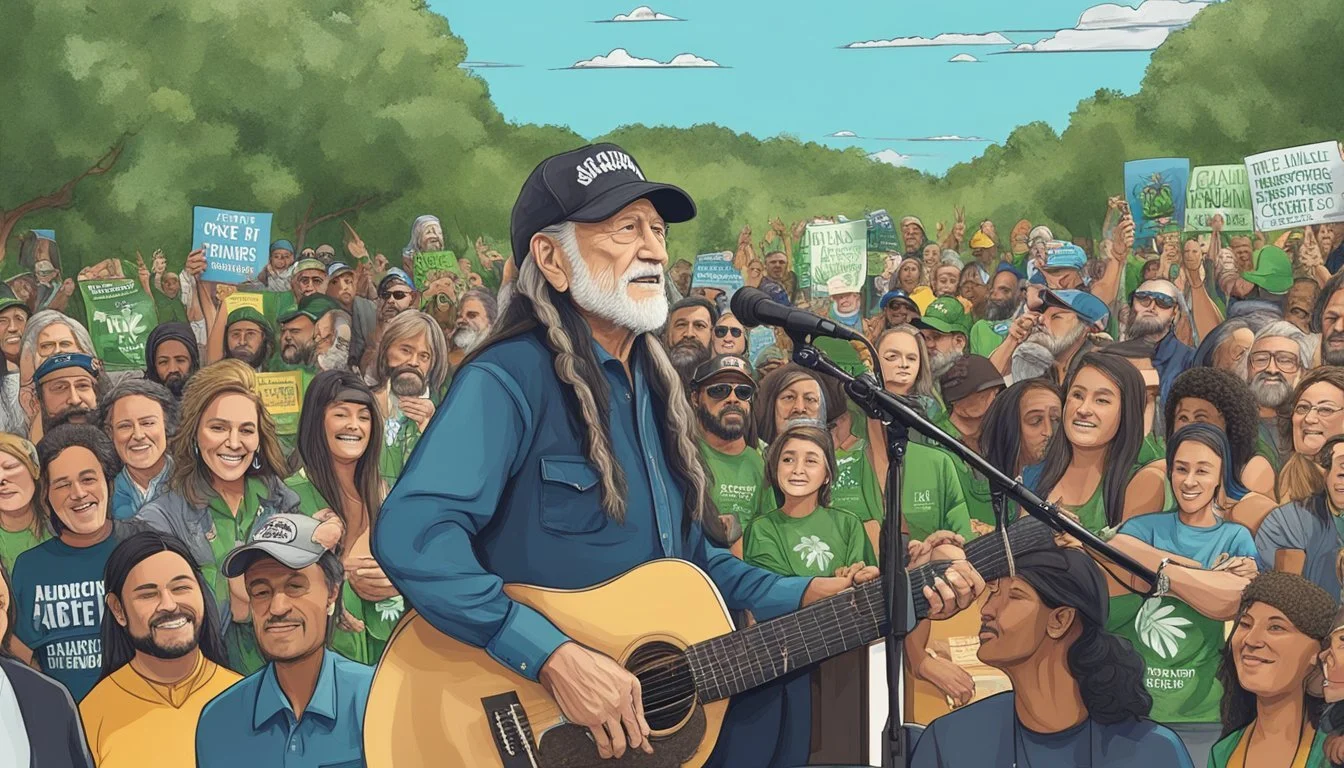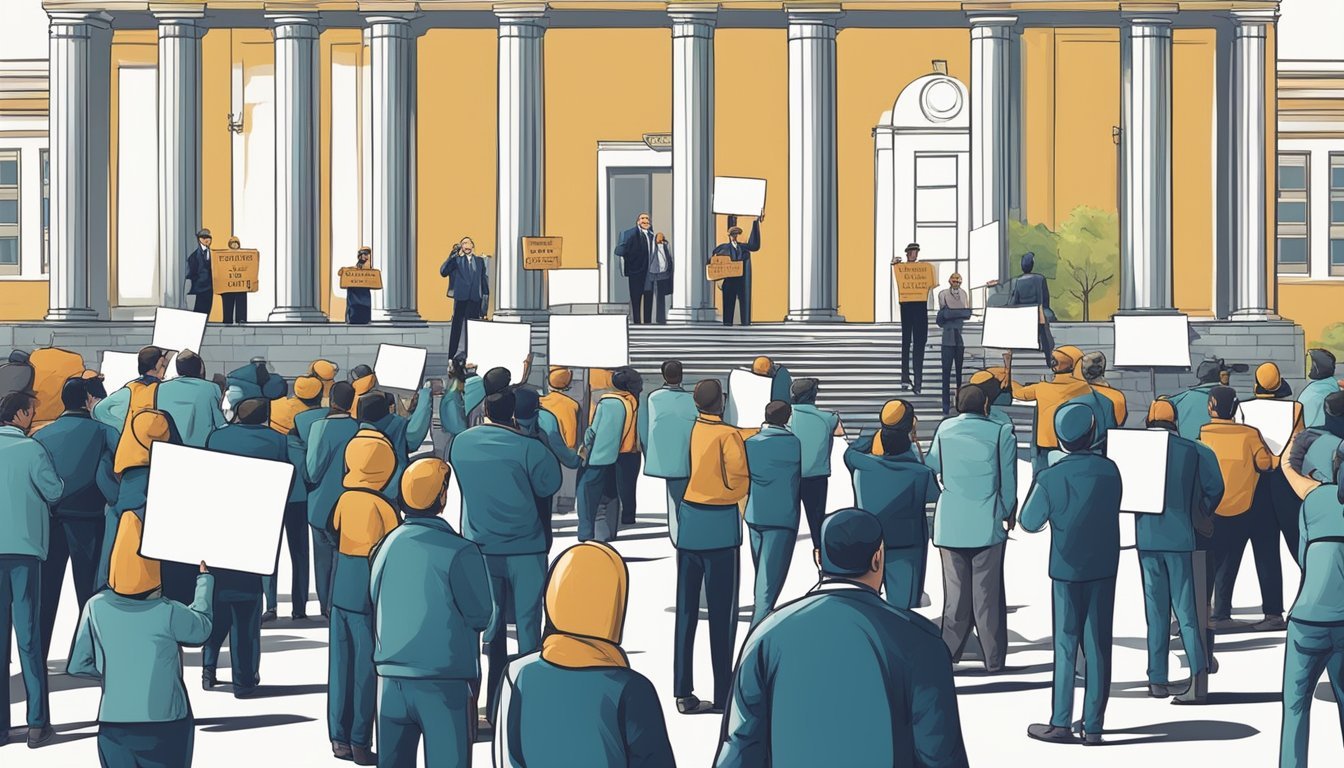Cannabis Legalization Efforts Documented in "Willie Nelson & Family" Showcases Music Icon's Advocacy Journey
The upcoming documentary series "Willie Nelson & Family" offers an intimate look at the legendary musician's life and career, including his long-standing advocacy for cannabis legalization. Set to premiere on Paramount+ in December, the series promises to explore Willie Nelson's influential role in the movement to end marijuana prohibition.
Willie Nelson's support for cannabis reform has helped shape public opinion and policy debates over several decades. His openness about his own cannabis use and his founding of Willie's Reserve, a line of cannabis products, have made him an icon in both music and marijuana circles. The documentary is likely to examine how Nelson's activism has contributed to changing attitudes and laws surrounding cannabis.
The series may also delve into the broader cultural shifts around cannabis use and legalization efforts in the United States. As more states have moved to legalize marijuana for medical and recreational use, Nelson's early advocacy has proven prescient. Viewers can expect to gain insights into the personal experiences that shaped Nelson's views on cannabis and how his public stance has evolved alongside the national conversation on drug policy reform.
Historical Context of Cannabis Legalization
Cannabis prohibition in the United States dates back to the early 20th century. Over the decades, attitudes and laws have evolved significantly, influenced by social movements, scientific research, and changing cultural norms.
Early Legalization Movements
The push for cannabis legalization gained momentum in the 1960s and 1970s. Counterculture movements and anti-war protests challenged existing drug laws. In 1972, the National Organization for the Reform of Marijuana Laws (NORML) was founded to advocate for legalization.
Some states began decriminalizing cannabis possession in small amounts. Oregon led the way in 1973, followed by several other states throughout the decade. These early efforts focused on reducing penalties rather than full legalization.
Public Perception Shifts
Public opinion on cannabis use has changed dramatically over time. In the 1970s, support for legalization hovered around 20%. By the 2000s, this number had doubled.
Media portrayals of cannabis evolved from demonization to more nuanced depictions. Celebrity advocates, including musicians like Willie Nelson, helped normalize discussions about cannabis use.
Education efforts highlighted the differences between cannabis and other controlled substances. This led to increased questioning of cannabis's classification as a Schedule I drug.
Medicinal Cannabis Milestones
The AIDS crisis of the 1980s and 1990s sparked interest in medicinal cannabis. Patients found relief from symptoms and side effects of treatments, leading to grassroots advocacy efforts.
California passed Proposition 215 in 1996, becoming the first state to legalize medical cannabis. This landmark decision paved the way for other states to follow suit.
Research into cannabinoids and the endocannabinoid system expanded scientific understanding of cannabis's potential medical applications. This helped shift the conversation from a criminal justice issue to a public health matter.
Willie Nelson & Family's Advocacy
Willie Nelson and his family have been influential advocates for cannabis legalization, using their platform to raise awareness and push for policy changes. Their efforts have spanned decades and involved various approaches to promoting reform.
Willie Nelson's Role and Influence
Willie Nelson has been a prominent figure in cannabis advocacy since the 1970s. He openly discusses his personal use of marijuana and its benefits. Nelson co-chairs the advisory board of the National Organization for the Reform of Marijuana Laws (NORML).
His advocacy extends beyond personal use. Nelson promotes hemp as an environmentally friendly alternative for various industries. He launched his own cannabis brand, Willie's Reserve, in 2015 to support small farmers and promote sustainable practices.
Nelson's music often touches on cannabis themes, further spreading his message to a wide audience.
Collaborations and Support
The Nelson family collaborates with various organizations to advance cannabis reform. They work closely with NORML, participating in events and fundraisers.
Willie Nelson has teamed up with other celebrities and musicians to raise awareness. He's performed at benefit concerts for legalization initiatives across the United States.
The family supports research into medical marijuana applications. They've donated to studies exploring cannabis treatments for conditions like epilepsy and PTSD.
Their advocacy extends to criminal justice reform, pushing for the release of non-violent offenders incarcerated for marijuana-related charges.
Impact on Legislation
Willie Nelson's advocacy has contributed to changing public perception and policy around cannabis. He's met with legislators to discuss reform measures and testified before government committees.
The Nelson family's efforts have helped build momentum for state-level legalization initiatives. They've campaigned for ballot measures in various states, using their influence to garner support.
Their advocacy has also focused on federal reform. Willie Nelson has pushed for the rescheduling of marijuana under the Controlled Substances Act and the passage of the SAFE Banking Act to allow cannabis businesses access to financial services.
The family continues to be active in promoting cannabis policy reform, leveraging their public platform to keep the issue in the national spotlight.
Legislative Progress
Cannabis legalization has made significant strides in recent years, with varying approaches at state, federal, and international levels. Key developments include expanding state-level programs, renewed efforts for federal reform, and evolving global perspectives on marijuana policy.
State-Level Legalization
As of 2024, 38 states have legalized medical marijuana, while 23 states and Washington D.C. have approved recreational use for adults. California led the way with medical legalization in 1996, followed by Colorado and Washington state legalizing recreational use in 2012.
Recent additions include:
New York (2021)
Virginia (2021)
New Mexico (2021)
Connecticut (2021)
Rhode Island (2022)
State programs differ in regulations around possession limits, home cultivation, and retail sales. Tax revenues from legal cannabis have funded education, infrastructure, and drug treatment programs in many states.
Federal Legalization Efforts
While cannabis remains illegal at the federal level, momentum for change has grown. The MORE Act, which would decriminalize marijuana nationally, passed the House in 2020 and 2022 but stalled in the Senate.
Key federal developments:
2018: Farm Bill legalized hemp (cannabis with <0.3% THC)
2019: SAFE Banking Act introduced to allow cannabis businesses access to banking services
2021: Cannabis Administration and Opportunity Act proposed in Senate
Challenges remain due to conflicting state and federal laws. The Biden administration has expressed support for decriminalization and rescheduling marijuana under the Controlled Substances Act.
International Perspectives
Global cannabis policy is evolving, with several countries adopting more progressive stances:
Country Year Policy Canada 2018 Full legalization Uruguay 2013 Full legalization Netherlands 1976 Decriminalization Portugal 2001 Decriminalization of all drugs
Mexico's Supreme Court ruled prohibition unconstitutional in 2018, prompting lawmakers to draft legalization legislation. The United Nations removed cannabis from its list of most dangerous drugs in 2020, potentially influencing future international policies.
Economic Implications
Cannabis legalization has far-reaching economic effects. It spurs industry growth, generates new jobs, and provides substantial tax revenue for governments to allocate towards various public initiatives.
Cannabis Industry Growth
The legal cannabis market has experienced rapid expansion in recent years. As more states legalize marijuana, the industry is projected to reach $30 billion in annual sales by 2025. This growth attracts investors and entrepreneurs, leading to the creation of new businesses across cultivation, processing, retail, and ancillary services.
Cannabis companies are increasingly going public, with some achieving multi-billion dollar valuations. The industry's expansion has also spurred innovation in agricultural technology, product development, and consumption methods.
Job Creation
Legalization has become a significant driver of employment opportunities. The cannabis sector now supports over 300,000 full-time jobs in the United States. These positions span various fields, including:
Cultivation specialists
Retail staff
Laboratory technicians
Marketing professionals
Legal experts
Many of these jobs offer competitive salaries and benefits, contributing to local economic development. The industry also indirectly supports roles in adjacent sectors like construction, security, and packaging.
Tax Revenue and Allocation
Cannabis legalization has generated substantial tax revenue for states and municipalities. In 2023, states collected over $3 billion in cannabis taxes. This income is often earmarked for specific purposes:
Allocation Percentage Education 35% Healthcare 25% Infrastructure 20% Drug prevention 15% Law enforcement 5%
Some jurisdictions use these funds to support social equity programs, aiming to address disparities caused by previous prohibition policies. The influx of tax revenue has helped bolster state budgets and fund critical public services.
Social and Cultural Impact
Willie Nelson's advocacy for cannabis legalization has profoundly influenced public perception and cultural norms. His efforts have contributed to destigmatization, shaped recreational use attitudes, and inspired artistic expression within cannabis culture.
Destigmatization of Cannabis
Willie Nelson's open advocacy has played a crucial role in normalizing cannabis discussions. His high-profile support lends credibility to the legalization movement, challenging long-held stereotypes. Nelson's involvement with NORML (National Organization for the Reform of Marijuana Laws) has helped educate the public about cannabis benefits and policy reform.
The country music legend's stance has encouraged more open dialogue about cannabis use in mainstream media. His personal anecdotes and experiences have humanized the issue for many fans and skeptics alike. This shift in perception has contributed to reduced stigma around medical marijuana use.
Nelson's influence extends beyond his fan base, reaching policymakers and influencing legislative discussions. His consistent messaging has helped frame cannabis as a matter of personal freedom and medical necessity rather than a criminal issue.
Recreational Use and Society
Willie Nelson's advocacy has coincided with evolving societal attitudes toward recreational cannabis use. His public persona as a successful, respected artist who uses cannabis challenges negative stereotypes associated with marijuana consumers.
Nelson's openness about his cannabis use has sparked conversations about responsible consumption and its place in everyday life. This dialogue has contributed to more nuanced public discourse on the role of cannabis in society.
The Willie Nelson & Family band's tours and performances often create spaces where fans feel comfortable discussing and sometimes consuming cannabis. This has inadvertently created a model for social cannabis use in entertainment settings.
Artistic Expression and Cannabis Culture
Willie Nelson's music and public image have become intertwined with cannabis culture, influencing artistic expression across genres. His songs often reference cannabis, normalizing its presence in popular music.
Nelson's cannabis-friendly events and festivals have created platforms for artists to explore themes related to marijuana in their work. This has led to a rich subculture of cannabis-inspired art, music, and literature.
The country icon's collaborations with other artists on cannabis-themed projects have bridged generational and genre gaps. This cross-pollination has expanded the reach of cannabis culture in the arts.
Nelson's influence extends to cannabis product branding and marketing. His name and image are associated with various cannabis products, lending authenticity to the emerging legal market.
Challenges and Criticisms
Cannabis legalization efforts face numerous obstacles and objections from various stakeholders. Legal complexities, health concerns, and organized opposition create significant hurdles for advocates of marijuana reform.
Legal and Regulatory Hurdles
Federal law in the United States still classifies marijuana as a Schedule I controlled substance. This creates conflicts between state and federal regulations in places that have legalized cannabis. Banks often refuse to work with marijuana businesses due to fear of federal prosecution.
Developing comprehensive regulations for a newly legal industry poses challenges. States must establish licensing systems, quality control measures, and tax structures. Ensuring compliance and preventing diversion to illegal markets requires significant resources.
Cross-border issues arise as neighboring jurisdictions maintain different laws. This complicates enforcement and creates legal gray areas for travelers and businesses operating across state lines.
Public Health Concerns
Critics argue that legalization may lead to increased marijuana use, especially among youth. They cite potential negative impacts on brain development, mental health, and cognitive function.
Driving under the influence of cannabis presents a public safety challenge. Reliable roadside testing methods for marijuana impairment are still in development.
Secondhand smoke exposure in public spaces raises concerns similar to tobacco. Balancing personal freedoms with public health considerations complicates policy decisions.
Opposition Groups and Arguments
Law enforcement agencies often oppose legalization, citing concerns about impaired driving and potential increases in crime. Some argue that marijuana serves as a gateway to harder drugs.
Religious and conservative groups frequently object on moral grounds. They worry about societal impacts and the message sent to children by legalizing a formerly illicit substance.
The pharmaceutical industry has lobbied against legalization in some cases. Cannabis could potentially compete with prescription medications, impacting their profits.
Some addiction treatment providers oppose legalization, fearing it may increase substance abuse problems. They argue that easier access could lead to more widespread dependency issues.
Future Outlook
Cannabis legalization efforts are gaining momentum, with significant changes expected in legislation, advocacy, and societal attitudes. The coming years may see expanded access, evolving regulations, and increased research into the plant's potential benefits and risks.
Potential Legislative Changes
More states are likely to legalize cannabis for medical and recreational use. Federal decriminalization or rescheduling of marijuana could occur, potentially opening doors for interstate commerce and banking access for cannabis businesses. Standardized regulations may emerge to ensure product safety and quality control across states. Lawmakers may focus on addressing social equity issues related to past cannabis convictions and creating opportunities for communities disproportionately affected by drug laws.
Continued Advocacy and Research
Advocacy groups, including those supported by Willie Nelson, will likely intensify efforts to promote cannabis reform. Increased funding for medical research may lead to new discoveries about cannabinoids' therapeutic potential. Studies on the long-term effects of cannabis use and its impact on public health will likely expand. Cannabis industry stakeholders may push for more favorable tax policies and reduced barriers to entry for small businesses.
Long-term Societal Effects
As cannabis becomes more mainstream, social stigma surrounding its use may decrease. Workplace policies regarding cannabis use could evolve, potentially leading to changes in drug testing practices. The cannabis industry may create new job opportunities and contribute to economic growth in regions where it's legal. Public health campaigns may focus on educating consumers about responsible use and potential risks. Integration of cannabis into wellness and lifestyle products could become more prevalent, influencing consumer trends and market dynamics.






